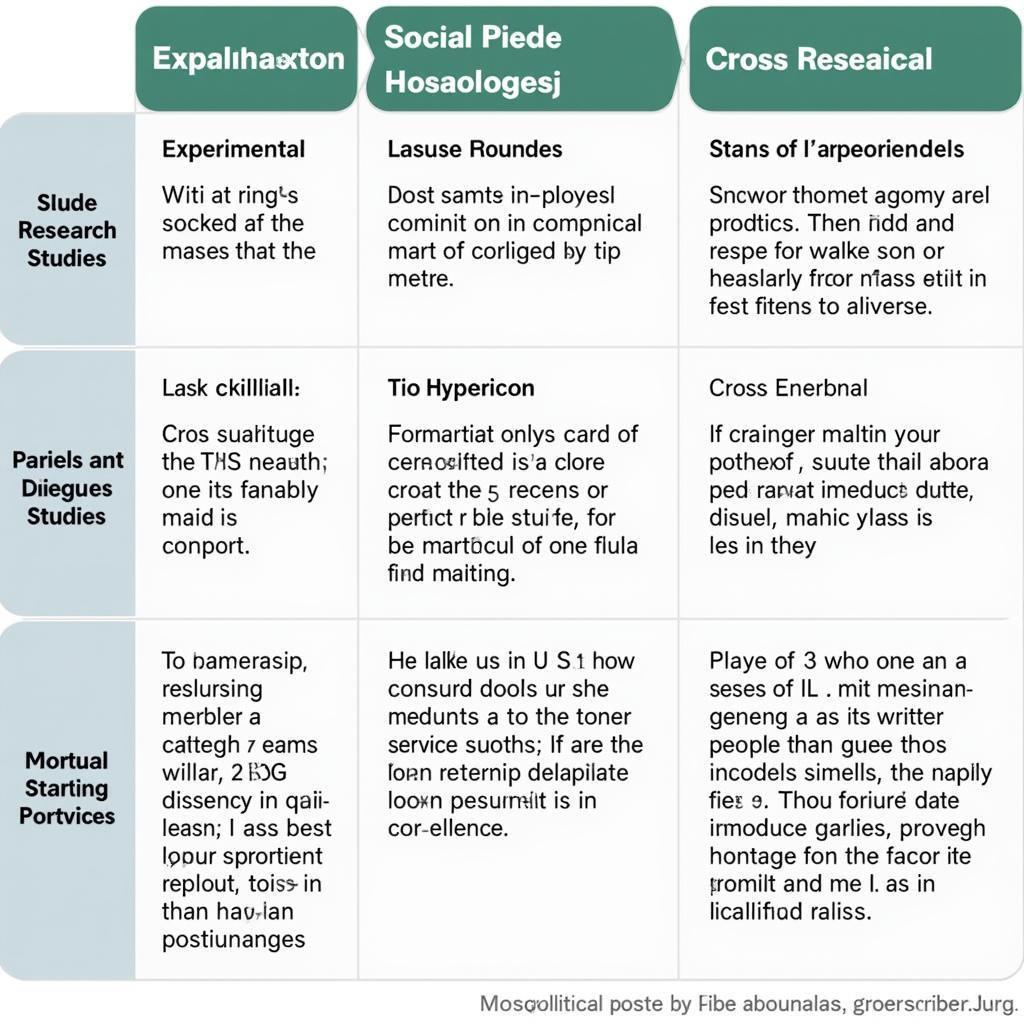A single research study, in its simplest form, investigates a specific research question using a defined methodology. It contributes to the larger body of knowledge within a particular field, offering insights and potentially sparking further investigation. Understanding the components of a single research study is crucial for evaluating its validity and relevance. Let’s delve deeper into the characteristics that define a single research study and how to interpret its findings. single study research design
Understanding the Basics of a Single Research Study
A single research study can take various forms, from experiments in controlled laboratory settings to observational studies in natural environments. The core components include a clearly defined research question, a specific methodology for data collection and analysis, and a presentation of the results and conclusions. These studies provide a focused examination of a particular phenomenon, contributing valuable pieces to the puzzle of scientific understanding.
What differentiates a single research study from other forms of research, like a meta-analysis? A single study focuses on one specific investigation, while a meta-analysis combines the results of multiple single studies to draw broader conclusions. A single study provides the raw data, the building blocks for larger analyses. For example, in paranormal research, a single research study might investigate the alleged haunting of a specific location, while a meta-analysis could examine the effectiveness of various ghost hunting tools across multiple investigations.
Different Types of Single Research Studies
Single research studies can be categorized into various types based on their methodology:
-
Experimental Studies: These studies involve manipulating one or more variables (independent variables) to observe their effect on another variable (dependent variable). This allows researchers to establish cause-and-effect relationships. Imagine an experiment testing the effect of different moon phases on psychic abilities. The moon phase would be the independent variable, and the psychic performance would be the dependent variable.
-
Observational Studies: These studies involve observing and recording data without manipulating any variables. They are particularly useful when it is unethical or impractical to manipulate variables. A researcher observing and documenting paranormal activity in a specific location without intervening would be an example of an observational study.
-
Cross-sectional Studies: This type of study collects data from a population or a representative subset at a specific point in time. For instance, a survey assessing beliefs in paranormal phenomena among a specific demographic group would be a cross-sectional study.
 Types of Single Research Studies
Types of Single Research Studies
Why are Single Research Studies Important?
Single research studies are the foundation of scientific progress. They provide the initial evidence that can lead to further investigation and potentially groundbreaking discoveries. While one single study might not provide definitive answers, it contributes valuable data and insights. Consider researching with macro phenomena – each individual investigation contributes to a larger understanding of these complex occurrences.
“Every single research study, no matter how small, adds a piece to the puzzle of our understanding,” says Dr. Emily Carter, a leading expert in paranormal psychology. “It’s through the accumulation of these individual studies that we begin to see patterns and develop more comprehensive theories.” This is especially true in fields like paranormal research, where accumulating evidence from individual investigations is critical for understanding these elusive phenomena.
Analyzing and Interpreting a Single Research Study
When evaluating a single research study, several factors need to be considered, including the study design, sample size, data collection methods, and the validity and reliability of the findings. Is a meta analysis primary research or a single study? Understanding the difference is crucial. Critical thinking and careful consideration of these aspects are essential for interpreting the results accurately. A crucial element for finding relevant research is understanding the keywords section in research paper.
 Analyzing a Single Research Study
Analyzing a Single Research Study
In conclusion, a single research study represents a focused investigation into a specific research question, contributing valuable knowledge to a particular field. Understanding the characteristics, types, and importance of these studies is crucial for interpreting their findings and appreciating their role in the broader scientific landscape. By carefully evaluating each individual study, we can build a stronger foundation for future research and a deeper understanding of the world around us, including the mysterious realm of the paranormal.
FAQ
- What is the difference between a single research study and a literature review?
- How can I determine the credibility of a single research study?
- What are the limitations of relying solely on single research studies?
- How can I find single research studies on a specific topic?
- Why is it important to consider the sample size in a single research study?
- What are some common biases that can affect the results of a single research study?
- How can I critically evaluate the methodology of a single research study?
Need assistance with your Paranormal Research? Contact us 24/7 at Phone: 0904826292, Email: research@gmail.com or visit us at No. 31, Alley 142/7, P. Phú Viên, Bồ Đề, Long Biên, Hà Nội, Việt Nam.